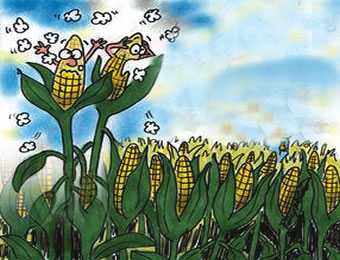
Economic growth and prosperity are central to long-term poverty alleviation for social and environmental sustainability. The vegetable oil industry represents one of the most effective avenues for poverty alleviation, job creation and economic stability in Nigeria. The industry has the prospects of providing employment for millions of skilled and semi-skilled people. As demonstrated in other economies, with proper focus on production of commodities of large scale commercial values, improvement in the production of vegetable oil can effectively mitigate the poverty level in Nigeria, and especially in northern Nigeria, which available statistics indicated is the poorest compared to other regions.
In 2006, there was an attempt by the National Assembly to look into the vegetable oil industry with a view to lifting the nation forward in the area of economic reforms in agriculture. Although the proposed bill initially was formulated as “Palm Oil Development Fund,” stakeholders in the industry, the Oil Seeds Processors Association of Nigeria (OSPAN) inclusive, raised concern on the contents of the proposed bill, which they described as narrow, while recommending a review of the bill. OSPAN specifically called the attention of the members of the National Assembly to an all-encompassing programme under a presidential initiative called Vegetable Oil Development Programme (VODEP). The committee’s outcome led to the inauguration of a presidential committee in 2003, saddled with the responsibility of formulating policies under VODEP that are capable of increasing the production of vegetable oil in Nigeria. Part of the committee’s recommendations approved by the Council of State in March, 2003 were: sustenance of vegetable oil ban, exemption of vegetable oil from VAT, among others.
However, the bill was not signed into law and since then, little has been heard about it. In the 1970s to 1980s, the groundnuts oil mills were the main producers of oil and cake in the country, and they formed the Groundnut Crushers Association (GCA), which has the sole objective of addressing the common challenges of its members. With time, the GCA transformed into Oil Seeds Processors Association of Nigeria (OSPAN), and this was to enable it embrace all other soft-oil bearing seeds that are largely and naturally available in the northern part of Nigeria.
The economic downturn in the early and middle of 1980s led to the implementation of stabilisation measures which included restriction on exports. This development led to the close down of many industries, while the few ones that survived were forced to retrench a large proportion of their workforce. This continued throughout the 1990s. With the return to democracy in 1999, hopes were raised, and luckily for the country, there was an upsurge of oil prices in the global market. Sixteen years after, the country is back to ground zero, as oil prices have crumbled and Nigeria is again faced with so many social and economic crises.
Some of the crises include rise in the level of poverty, shut down of many industries and businesses. Automatically, this is bringing about job losses and its ripple effect are being felt everywhere in the country. The crises in the labour market, and the menace it posed to Nigeria’s national security, led the Federal Government to mention in its manifesto that job creation is its major priority.
This government, on coming on board, sprang into action and specifically mentioned its intention to increase the number of small and medium-sized enterprises that can create new jobs.
This is, in our opinion, an indication from the government that it has the will to address some of the inherent problems that crippled the nation’s economy. To do this, I think the government needs to look into the opportunities OSPAN and other vegetable oil processors offer, in terms of semi-skilled and skilled employment, as well as the value chain of that industry.
Today, despite numerous challenges, OSPAN has been recognised in relevant government ministries like Agriculture, Industries, Commerce, NAFDAC, RMRDC, Customs Service, NEPC and some development financial institutions, as well as the offices of key lawmakers of the National Assembly, and this has made the organisation to attract favourable policies from government. Also, affordable machineries from China and India have made OSPAN to operate more efficiently.
On record, there were 41 oil mills scattered all over northern Nigeria, and an equally substantial number are also found in the south of the country. With an investment of N37 billion monthly, and a turn-over of over N80 billion, the oil mill industries have the capacity to offer direct and indirect employment to over four million people.
One can see the zeal, enthusiasm and commitment of OSPAN members to continue production, even though at very low capacity. Now, with over 50 well-established oil mills and over 150 small scale processors, all engaged in the processing and marketing of arable oil seeds, OSPAN is a force to reckon with as the industrial association for arable oil seeds processors.
Therefore, any transformation of the country’s agricultural sector must also take a look at the oil seeds sector to ensure increase in domestic production on a sustainable basis.
- Lawanti is of the Ahmadu Bello University (ABU), Zaria.
WATCH TOP VIDEOS FROM NIGERIAN TRIBUNE TV
- Let’s Talk About SELF-AWARENESS
- Is Your Confidence Mistaken for Pride? Let’s talk about it
- Is Etiquette About Perfection…Or Just Not Being Rude?
- Top Psychologist Reveal 3 Signs You’re Struggling With Imposter Syndrome
- Do You Pick Up Work-Related Calls at Midnight or Never? Let’s Talk About Boundaries






